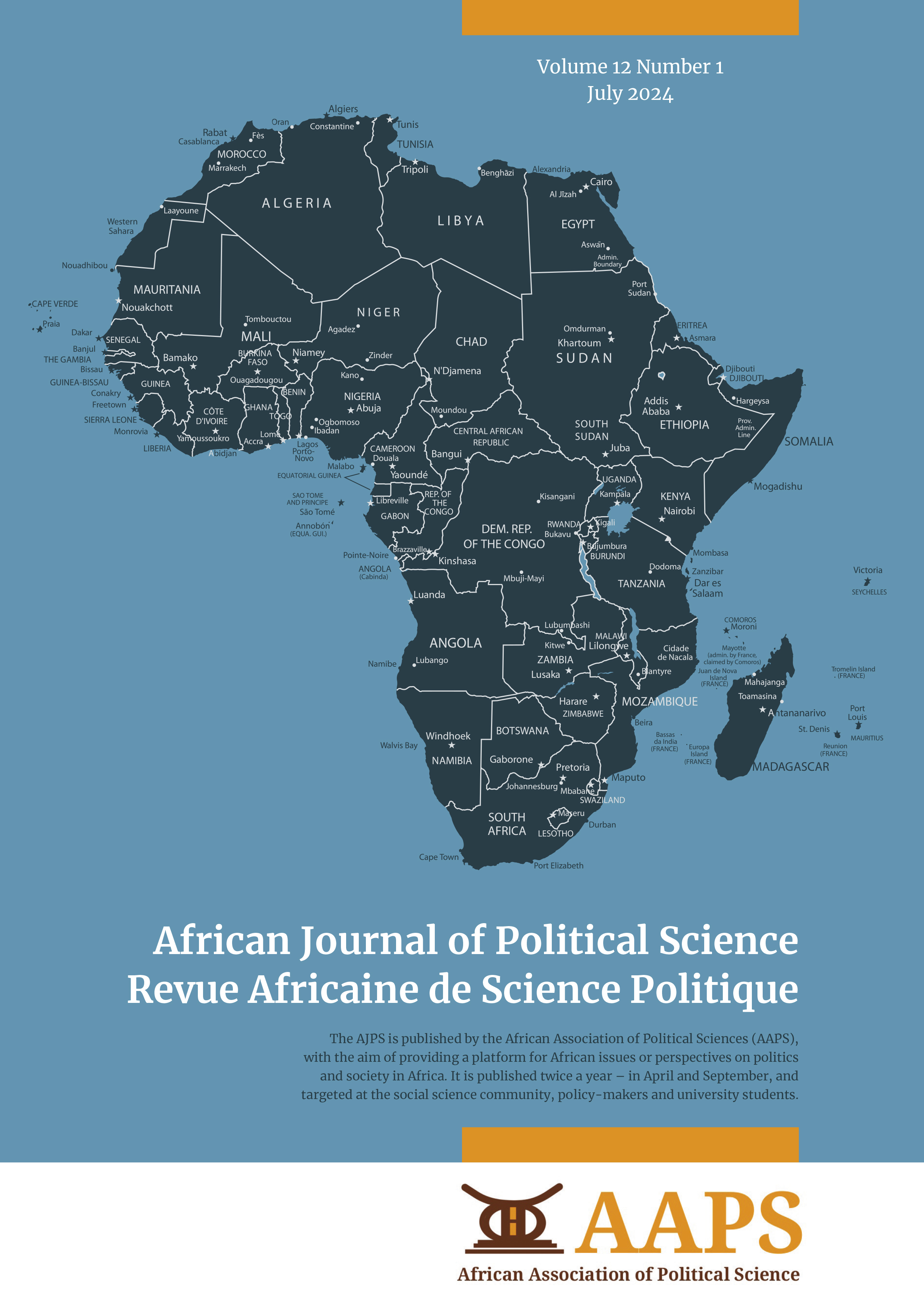Lived Poverty and the Fate of African Democracies
Main Article Content
Keywords
Democracy, Afrobarometer, Lived Poverty, Political Participation, Economic development
Abstract
In comparative politics, economic development is a requisite to democracy (Lipset, 1959). Democracy is deemed to fail in less developed countries as poverty has proven to be detrimental to democratic performance. This study offers a perspective on the effects of poverty on the fate of democracy in Africa. Models are estimated for the Poverty-Democracy linkages using variables derived from merged Afrobarometer survey data (2002-2018). The results indicate that poverty in Africa has a mixed effect on democracy more generally. In particular, the analysis indicates that the experience of poverty, which we have termed ‘lived poverty’, has a negative effect on demand and supply of democracy as well as on a number of attributes of political participation. The fact that the poor demand democracy less than the well-to-do while at the same time perceiving limited supply of democracy, in our view explains why more African regimes are consolidating as hybrid regimes instead of moving towards democratic consolidation
Article Metrics Graph
References
Bourguignon, F., & Chakravarty, S. R. (2019). Multidimensional poverty orderings: theory and applications. In Poverty, Social Exclusion and Stochastic Dominance (pp. 143-166). Springer, Singapore. https://doi.org/10.1007/978-981-13-3432-0_10
Bratton, M. and Mattes, R. (2001). Africa’s Surprising Univeralism. Journal of Democracy, 12(1), 107-121. https://doi.org/10.1353/jod.2001.0002
Bratton, M. (2008). Vote buying and violence in Nigerian election campaigns. Electoral Studies, 27(4), 621-632. https://doi.org/10.1016/j.electstud.2008.04.013
Bratton, M. (2012). Trends in Popular Attitudes to Multiparty Democracy in Africa, 2000-2012. Afrobarometer Briefing Paper Series (Paper No. 105).
Bratton, M., & Van de Walle, N. (1997). Democratic experiments in Africa: Regime transitions in comparative perspective. Cambridge University Press. https://doi.org/10.1017/CBO9781139174657
Bratton, M., Mattes, R., & Gyimah-Boadi, E. (2005). Public opinion, democracy, and market reform in Africa. Cambridge University Press. https://doi.org/10.1017/CBO9780511617324
Diamond, L. (1992). Economic development and democracy reconsidered. American Behavioral Scientist, 35(4-5), 450-499. https://doi.org/10.1177/000276429203500407
Hagenaars, J. A. (1988). Latent structure models with direct effects between indicators: local dependence models. Sociological Methods & Research, 16(3), 379-405. https://doi.org/10.1177/0049124188016003002
Helliwell, J. F. (1994). Empirical linkages between democracy and economic growth. British Journal of Political Science, 24(2), 225-248. https://doi.org/10.1017/S0007123400009790
Joseph, R. (1997). Democratization in Africa after 1989: Comparative and theoretical perspectives. Comparative Politics, 29(3), 363-382. https://doi.org/10.2307/422126
King, E., & Van de Walle, D. (2007). Schooling, poverty, and disadvantage in the Lao People’s Democratic Republic in Lewis M. & Lockheed M (Eds.), Exclusion, Gender and Education: Case Studies from the Developing World. Washington, DC: Center for Global Development.
Krishna, A., & Haglund, E. (2008). Why do some countries win more Olympic medals? Lessons for social mobility and poverty reduction. Economic and Political Weekly, 143-151.
Kumlin, S. (2010). Book Review: Anirudh Krishna (ed.) Poverty, Participation, and Democracy: A Global Perspective Cambridge: Cambridge University Press, 2008, 189 pp. Acta Sociologica, 53(3), 293-295. https://doi.org/10.1177/00016993100530030704
Lindberg, S. I., & Lindberg, S. (2006). Democracy and elections in Africa. JHU Press. https://doi.org/10.1353/book.3263
Lipset, S. M. (1959). Democracy and working-class authoritarianism. American Sociological Review, 482-501. https://doi.org/10.2307/2089536
Lipset, S. M. (1959). Some social requisites of democracy: Economic development and political legitimacy. American Political Science Review, 53(1), 69-105. https://doi.org/10.2307/1951731
Lipset, S. M. (1963). The value patterns of democracy: A case study in comparative analysis. American Sociological Review, 515-531. https://doi.org/10.2307/2090068
Lipset, S. M. (1994, June). The state of American sociology. Sociological Forum, 9(2), 199-220. https://doi.org/10.1007/BF01476362
Lipset, S. M., & Bence, G. (1994). Anticipations of the Failure of Communism. Theory and Society, 169-210. https://doi.org/10.1007/BF00993814
Magnusson, B. A., & Clark, J. F. (2005). Understanding Democratic Survival and Democratic Failure in Africa: Insights from Divergent Democratic Experiments in Benin and Congo (Brazzaville). Comparative Studies in Society and History, 47(3), 552-582. https://doi.org/10.1017/S0010417505000253
Mattes, R. B., & Bratton, M. (2009). Poverty reduction, economic growth and democratization in Sub-Saharan Africa. Institute for Democracy in South Africa.
Minier, J. A. (1998). Democracy and growth: Alternative approaches. Journal of Economic Growth, 3(3), 241-266. https://doi.org/10.1023/A:1009714821770
Posner, R. A. (1997). Equality, wealth, and political stability. The Journal of Law, Economics, and Organization, 13(2), 344-365. https://doi.org/10.1093/oxfordjournals.jleo.a023387
Przeworski, A., Alvarez, M., Cheibub, J. A., & Limongi, F. (1996). What makes democracies endure? Journal of Democracy, 7(1), 39-55. https://doi.org/10.1353/jod.1996.0016
Przeworski, A., Alvarez, R. M., Alvarez, M. E., Cheibub, J. A., Limongi, F., & Neto, F. P. L. (2000). Democracy and development: Political institutions and well-being in the world, 1950-1990 (No. 3). Cambridge University Press. https://doi.org/10.1017/CBO9780511804946
Remmer, K. L. (1995). Review: New Theoretical Perspectives on Democratization. Comparative Politics, 28(1), 103-122. https://doi.org/10.2307/421999
Rosenstone, S. J. (1982). Economic Adversity and Voter Turn Out, American Journal of Political Science, 26(1) , 25-46. https://doi.org/10.2307/2110837
Sandbrook, R. (1996). Democratization and the implementation of economic reform in Africa. Journal of International Development: The Journal of the Development Studies Association, 8(1), 1-20. https://doi.org/10.1002/(SICI)1099-1328(199601)8:1<1::AID-JID285>3.0.CO;2-M
Sandbrook, R. (1996). Transitions without consolidation: democratization in six African cases. Third World Quarterly, 17(1), 69-88. https://doi.org/10.1080/01436599650035789
Van de Walle, N. (2002). Elections without democracy: Africa’s range of regimes. Journal of Democracy, 13(2), 66-80. https://doi.org/10.1353/jod.2002.0032
Kapstein, E. B., & Converse, N. (2008). Poverty, inequality, and democracy: Why democracies fail. Journal of Democracy, 19(4), 57-68. https://doi.org/10.1353/jod.0.0031
Isaksson, A. S. (2014). Political participation in Africa: The role of individual resources. Electoral Studies, 34, 244-260. https://doi.org/10.1016/j.electstud.2013.09.008
Mattes, R., Bratton, M., & Davids, Y. D. (2002). Poverty, survival and democracy in Southern Africa.
Tambe, E. B. (2017). Electoral participation in African democracies: The impact of individual and contextual factors. Commonwealth & Comparative Politics, 55(2), 119-140. https://doi.org/10.1080/14662043.2017.1274868






